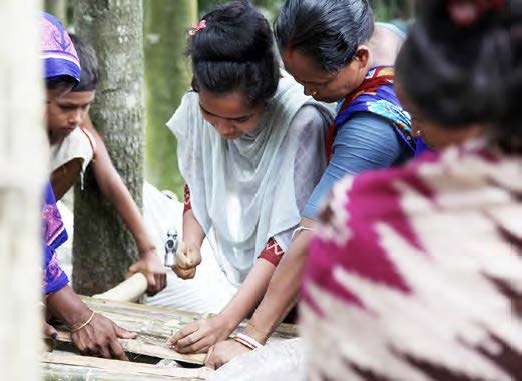In Dinajpur, Bangladesh, a construction training program led by AzuKo and a local NGO supports impoverished women with a comprehensive strategy. The program contributes to enhancing community resilience to climate-induced disasters by promoting eco-friendly design and locally available materials and strengthening women’s skills in the male dominated building sector. This multifaceted initiative challenges patriarchal norms and persisting gender inequalities by fostering democratic decision-making for women in their communities. AzuKo also supports women’s saving groups through low-interest loans and financial training.
| Climate impact |
 |
House strengthening techniques foster resilience to climate disasters, addressing climate injustice. |
 |
Using local, ecological and cost-effective materials to reduce carbon footprint. |
 |
Focus on waste recycling and management facilities,
wastewater treatment plants, and public gardens. |
| Gender impact |
 |
727 women equipped with knowledge, skills, and confidence in designing and building safer homes. 1000 more will be trained until 2025. |
 |
Accessibility to trainings is enhanced by alleviating women’s childcare burden, accommodating training schedules and providing travel support and local language. |
 |
Supports women’s savings groups via access to loans and financial trainings. |
| Scalability/replicability |
 |
Collaborates with local women’s organizations to expand training and advocacy initiatives. |
 |
Conducts housing needs assessments, pre-and post-training and advocacy initiatives. |
|
|








